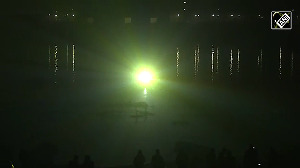Katyal will be the number two person at the solicitor general's office in the department of justice.
On June 29, 2006, when the US supreme court sided with Katyal's arguments on behalf of Salim Ahmed Hamdan -- a former chauffeur for Osama bin Laden -- which challenged the policy of military trials at Guantanamo Bay and found that President George W Bush's military tribunals violated the constitutional separation of powers, domestic military law and international law, Katyal earned himself a place in the legal history of the United States and a niche as a legal prodigy unprecedented for an Indian-American attorney.
He now creates history once again, by becoming the highest ranking Indian American in the US department of justice.
Subodh Chandra, who was a year senior to Katyal at the Yale Law School, said of Katyal's appointment, "I am almost speechless with joy."
"I always admired his passion for justice, his intellect and good humour," Chandra said. "I've been incredibly proud as I watched his career evolve, just experiencing delirium at every success. He is a perfect choice."
In a recent interview with rediff.com, Katyal, Paul and Patricia Saunders Professor of National Security Law at the Georgetown University Law School, said the Hamdan ruling was definitely the highlight of his career and right up there with his earlier crowning achievements of "being selected by President Clinton as a co-reporter of his challenge to lawyers to do more pro bono work, and being selected by Vice-President Al Gore as his co-counsel in the 2000 election dispute at the Supreme Court," in the disputed election that brought George W Bush to the Oval Office.
The New York Times's Linda Greenhouse wrote at the time of Katyal's taking on the Bush administration and dragging it to the supreme court and beating the powers that be as 'a defining moment in the ever-shifting balance of power among branches of government that ranked with the court's order to President Richard M Nixon in 1974 to turn over the Watergate tapes, or with the court's rejection of President Harry S Truman's seizing the nation's steel mills.'
Former solicitor general and Duke University law professor Walter Dellinger said, 'Hamdan is simply the most important decision on presidential power and the rule of law ever. Ever.'
Thereafter, it was only natural that Katyal -- an expert in constitutional law, particularly the role of the US President and Congress in time of war and theories of constitutional interpretation, who has parlayed his theoretical work for practical consequences in the federal courts -- acquired celebrity status.
He was named Lawyer of the Year in 2006 by Lawyers USA, Runner-up for Lawyer of the Year 2006 by the National Law Journal, one of the top 50 litigators nationwide 45 years old or younger by American Lawyer in 2007, one of the 30 best advocates before the US supreme court by Washingtonian magazine in 2007.
Barack Obama had him over for a two-hour debate and since then consulted with him regularly for speeches and as an informal campaign adviser.
The New York Times magazine writer Jonathan Mahler recently published The Challenge: Hamdan v Rumsfeld and the Fight Over Presidential Power, with Katyal as one ofthe protagonists.
Hollywood star George Clooney and his movie company Smokehouse bought the rights to the book. Katyal and Clooney held preliminary talks about a consulting role for this legal eagle whenever the movie took shape.
Surely, he had proved worthy of what his former Yale law professor and mentor Akhil Amar had described as 'the most memorable student I've ever met,' and undeniably, the summer internships he did while at law school proved propitious. During his first summer he worked in Vice-President Al Gore's office and the next summer interned in the solicitor general's office.
The third and final summer before he graduated he was with the top Washington law firm of Hogan & Hartson, where he worked under then supreme court litigator and now Chief Justice John G Roberts.
Chandra, former law director of the city of Cleveland, Ohio, told rediff.com that "Neal has the strength of character to resist the seduction of government power, but also has the ability to persuade a morally correct position. I am convinced he is going to do a magnificent job in his new role."
"It is a sign of future success to come for him," he acknowledged because the consensus has been that in perhaps in a decade or so Katyal is supreme court justice material, "but the best part of it all is that Neal makes every decision with a strong inward sense about what's really right for him and for the public and he listens to that inner voice and doesn't listen to what other people think he ought to be doing and I think that's what's going to make him so effective."
Chandra said the Hamdan case was a tangible manifestation of this facet of Katyal. "And, again, whether you agree or disagree with the position he took, you have to admire the fact that he took enormous personal risk in doing it. I'm just thrilled beyond measure. I think he's going to be magnificent."
"I am just incredibly proud that somebody I've known since we were puppies is doing so well and deservedly so," he gushed.
Born and raised in Chicago, Katyal was in public schools from elementary to middle school and then "my parents wanted to keep me away from girls, so they sent me to a Catholic boy's school, the Loyola Academy in Chicago."
He went to Dartmouth for his bachelor's degree in government and Indian history, then to the Yale Law School.
The enviable summer internships during law school were followed after graduation with a clerkship with his former dean, Guido Calabresi, whom President Clinton had appointed to the court of appeals in New York City.
Katyal then came down to Washington for a second clerkship at the supreme court with Justice Stephen Breyer.
He recalls that "I was interviewing for teaching jobs while I was clerking and I got some" but the relationship he had developed with Al Gore in the summer of 1988 led to a call from the vice-president's chief of staff that Eric Holder was going to be nominated as deputy attorney general "and whether I would want to sit down and see if I were interested in an appointment in the Justice Department. I met him and he hired me right away and so I went to work for the Department of Justice."
Holder has been appointed attorney general by Obama, and although he faces a tough confirmation process, is expected to be confirmed by the US Senate.






 © 2025
© 2025